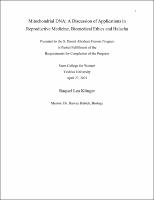Please use this identifier to cite or link to this item:
https://hdl.handle.net/20.500.12202/6872| Title: | Mitochondrial DNA: A Discussion of Applications in Reproductive Medicine, Biomedical Ethics and Halacha |
| Authors: | Babich, Harvey Klinger, Raquel Lea |
| Keywords: | Mitochondrial DNA reproductive medicine biomedical ethics halacha |
| Issue Date: | 27-Apr-2021 |
| Citation: | Klinger, R.L. (2021, April). Mitochondrial DNA: A Discussion of Applications in Reproductive Medicine, Biomedical Ethics and Halacha [Bachelor's honors thesis, Yeshiva University]. |
| Abstract: | All eukaryotic organisms have mitochondria; a vital double membrane-bound organelle. Unlike nuclear DNA, which is equally inherited paternally and maternally, mitochondrial DNA (mtDNA) is primarily inherited maternally. As such, mutations of the mtDNA are only transferred via the mother. Because of the number of mitochondria needed per cell and the up to 10 copies of mtDNA per mitochondrion, the rate at which a mutation may occur is very high. A mutation within mtDNA may have significant harmful effects on cellular energy production within cells. Mitochondrial diseases have been linked to many serious health conditions, including deafness, blindness, muscle weakness, cognitive impairment, and diabetes, as well as heart, liver and kidney failure (Bleich, 2015). About 1 in 4,000 people worldwide, and some 20,000 in the U.S. have mitochondrial diseases (Park, 2019). There are various methods of intervention that can be done to reduce the inheritance of mtDNA and subsequently prevent the development of life-threatening diseases in off-spring, including mitochondrial replacement therapy (MRT). However, there is much controversy around MRT from both ethical and halachic perspectives. From an ethical standpoint, MRT is included in a rider that Congress passed in 2016 under the Consolidated Appropriations Act, which banned germline modifications. This encompasses all genetic engineering of eggs, sperm, or early embryos. From a halachic standpoint, MRT is controversial because it involves aspects of egg donations. This raises the question of who the mother of the created offspring is, which is a complicated halachic issue. Knowing the exact identity of the mother is crucial, as the mother is responsible for the transmission of Jewish identity. The implications of these complicated ethical and halachic matters are discussed. |
| Description: | Senior honors thesis / Open access |
| URI: | https://hdl.handle.net/20.500.12202/6872 |
| Appears in Collections: | S. Daniel Abraham Honors Student Theses |
Files in This Item:
| File | Description | Size | Format | |
|---|---|---|---|---|
| Klinger Raquel OA Mitochondrial DNA April 2021.pdf | 844.11 kB | Adobe PDF |  View/Open |
This item is licensed under a Creative Commons License

